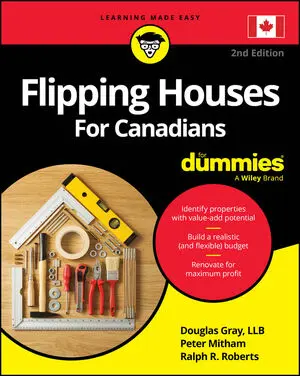Whether you're an average home buyer or a seasoned real estate investor, every search for the right home begins with a search for the right neighborhood. After all, location is everything.
You can make money in any real estate market, but some markets are more profitable than others. Trying to target flippable properties in an area where all the homes are immaculate and people tend to stay put is tough. Stable areas that have their fair share of ugly or unkempt homes provide enhanced opportunities. Look for areas that exhibit the following qualities:
- Steady or rising real estate values
- Multiple offers on recently sold homes and homes currently for sale
- An influx of homeowners moving in from other areas
- A decrease in the number of homes for rent
- An increase in the number of homeowners in the neighborhood moving into bigger homes rather than moving out
- Older homes — homes built at least 20 years ago — and homes that generally require more rehab
- Areas with aging homeowners — homeowners who may be downsizing or retiring
- Visible updating in older neighborhoods — new roofs, aluminum replaced with vinyl siding, replacement windows, modern earth tone trim paint
- City improvements including street repaving, new street lights and street signs, and repaved sidewalks
Although agents in your area can steer you toward hot markets, an agent may try to steer you toward her market instead. Talk with several agents who work in different areas you're considering before selecting an agent so you have a better feel for which areas are most conducive for flipping houses. Then, pick one of the top agents who knows the area inside and out.
Don't dismiss a neighborhood simply because it has few homes for sale. Every neighborhood has property for sale and people who need to sell it. In a tight market, you may just have to look a little longer.
Finding your focus
As you explore various neighborhoods in your town or city and evaluate their potential for flipping, you can save time by narrowing your focus to particular types of property or a specific area:
- New construction: When an area is growing rapidly, purchasing a newly built home where property values are rising provides an excellent opportunity to flip, especially if you can get a great deal on the property. (The people who stand to make the most money are the first 20 percent to buy into the area.)
- Depressed area that's on the rebound: An older neighborhood where homeowners are currently renovating their properties provides ample opportunities to buy, fix, and sell homes at a profit.
- Farm area: Pick a limited geographical area, which real estate insiders often refer to as a farm area. This area can be your ZIP code, a school system, your town or city, four major intersections that define your perimeter, or whatever else you want to use to set your boundary. Agents commonly use this technique to become experts in a particular area. As a flipper, you can take advantage of this same tactic.
Dissecting your city or town
Given about 30 seconds to mull it over, most residents of a town or city can name the upscale areas — neighborhoods where everyone would live if they could afford it. The selection of homes for sale may be slim pickings, but when you put the house back on the market, you have little trouble moving it.
Grab a map of your town or city and highlight the hot spots — areas where the rich people live, the artists hang out, or people gather for activities and entertainment. These are the happenin' places. Here you see a lot of new construction or older, well-kept homes. People walk or ride their bikes through the neighborhood and keep an eye out for any riffraff.
Run-down neighborhoods where the community center is the corner liquor store or a triple-X movie theater don't draw families and first-time home buyers.
You can resuscitate a dying neighborhood by investing heavily in it and changing its reputation over the long haul, but don't try to go it alone, and don't expect it to improve overnight. If you decide to rebuild a run-down area, work with other investors, town officials, local businesses, and neighborhood residents, and plan on sticking around for quite awhile.
Sticking close to home . . . or not
Pinpointing the hottest real estate market across town doesn't mean that's where you should set up your home base. Setting home base closer to home offers several advantages:
- You have a vested interest in the community.
- Getting up to speed on property values is less of a chore.
- Your neighbors can turn you on to great deals.
- Commuting distances are shorter.
- Neighborhood news and gossip are within earshot.
Farm your own neighborhood only if it makes financial sense to do so. If property values are falling without the hope of recovery, investing in your neighborhood can lead to your own financial demise and further deterioration of the neighborhood. If the neighborhood housing market is less than promising, you may need or want to prospect in more fertile areas, but try to stay within an hour's drive of your house.
Identifying areas in your price range
Your financing dictates where you can shop and how much house you can afford. When you spot an attractive area, a neighborhood you would consider farming, check real estate values in the area to make sure they're in your price range. Don't worry if you're eliminating neighborhoods that you thought were your best prospects. The process of elimination is necessary to establish a realistic focus.
Check the fringes of areas where homes are outside your price bracket. Adjacent areas often ride the coattails of their pricier neighbors. If you can time your purchase just right, you stand to earn a profit as the neighboring areas increase in popularity.






